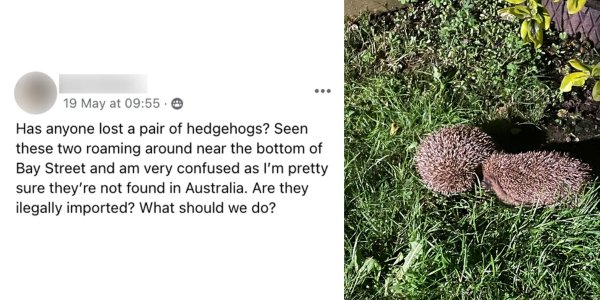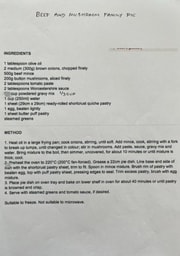Exotic animals found in suburb sparks mystery: 'Are they illegally imported?'
Australia is renowned for its unique and diverse wildlife, but it's also a country that takes biosecurity very seriously.
The recent stir in one of the nation's most affluent suburbs, Mosman, on the Sydney Harbourside, is a testament to the vigilance required to protect our delicate ecosystems.
A resident's post on a local community page sparked concerns and raised eyebrows when he inquired about a pair of hedgehogs he stumbled upon. The creatures are not native to Australia and could potentially be a prohibited invasive species.
The post, which included a photo of the animals, quickly garnered attention, with over 150 comments from concerned citizens and wildlife rescuers.
‘Has anyone lost a pair of hedgehogs?’ the man wrote.
The man noticed that while native echidnas are often referred to as hedgehogs, it was clear from the picture that the animals were not native. He continued, saying he was ‘very confused’ because he was ‘pretty sure they’re not found in Australia’.
The media outlet that initially reported the story stated that several wildlife rescuers were concerned that the pair could reproduce, posing a threat to native birds and reptiles in the area and potentially spreading disease.
Offers to retrieve the hedgehogs poured in, with some suggesting that the pair be sent to the nearby Taronga Zoo.
However, the trail goes cold there. The zoo confirmed they never received the hedgehogs, and the original poster has since been unreachable for further comment.
The New South Wales Department of Primary Industries (DPI) has also remained silent on the matter, leaving the community in the dark about the fate of these animals.
The possibility that the post was a hoax cannot be dismissed, but the implications of such a prank are far from amusing.
Hedgehogs can carry diseases like Salmonella, Q fever, and toxoplasmosis, which are transmissible to humans.
They also pose a risk to Australia's livestock industries, as they can harbour foot and mouth disease—something that is currently not in Australia.
Agriculture Victoria has highlighted the risks associated with African pygmy hedgehogs, which are sometimes illegally traded on the black market.
The illegal keeping and selective breeding of these animals could lead to them establishing a population in Victoria, which would be disastrous for local wildlife.
Across the Tasman Sea, New Zealand has already experienced the detrimental effects of hedgehogs on its native species.
These animals have become established in various habitats and are known to consume a wide range of prey, including endangered birds' eggs and chicks, lizards, and invertebrates.
The Department of Conservation in New Zealand has noted the 'major impact' hedgehogs have on their endangered wildlife.
A spokesperson said: ‘Hedgehogs are mainly insectivorous however they will eat almost any animal substance and some plant material. They find much of their prey by smell.’
This incident serves as a stark reminder of the importance of biosecurity and the need for community awareness. It's crucial for Australians to remain vigilant and report any sightings of unusual or potentially invasive species to the authorities.
The balance of our ecosystems is delicate, and it's our collective responsibility to protect it.
 As members of the Seniors Discount Club, we must be particularly mindful of our surroundings and the wildlife we encounter. Our experience and knowledge can be invaluable in identifying and reporting exotic pests.
As members of the Seniors Discount Club, we must be particularly mindful of our surroundings and the wildlife we encounter. Our experience and knowledge can be invaluable in identifying and reporting exotic pests.
Have you ever come across an unusual animal in your neighbourhood? What steps did you take? Share your stories and insights in the comments below.
The recent stir in one of the nation's most affluent suburbs, Mosman, on the Sydney Harbourside, is a testament to the vigilance required to protect our delicate ecosystems.
A resident's post on a local community page sparked concerns and raised eyebrows when he inquired about a pair of hedgehogs he stumbled upon. The creatures are not native to Australia and could potentially be a prohibited invasive species.
The post, which included a photo of the animals, quickly garnered attention, with over 150 comments from concerned citizens and wildlife rescuers.
‘Has anyone lost a pair of hedgehogs?’ the man wrote.
The man noticed that while native echidnas are often referred to as hedgehogs, it was clear from the picture that the animals were not native. He continued, saying he was ‘very confused’ because he was ‘pretty sure they’re not found in Australia’.
The media outlet that initially reported the story stated that several wildlife rescuers were concerned that the pair could reproduce, posing a threat to native birds and reptiles in the area and potentially spreading disease.
Offers to retrieve the hedgehogs poured in, with some suggesting that the pair be sent to the nearby Taronga Zoo.
However, the trail goes cold there. The zoo confirmed they never received the hedgehogs, and the original poster has since been unreachable for further comment.
The New South Wales Department of Primary Industries (DPI) has also remained silent on the matter, leaving the community in the dark about the fate of these animals.
The possibility that the post was a hoax cannot be dismissed, but the implications of such a prank are far from amusing.
Hedgehogs can carry diseases like Salmonella, Q fever, and toxoplasmosis, which are transmissible to humans.
They also pose a risk to Australia's livestock industries, as they can harbour foot and mouth disease—something that is currently not in Australia.
Agriculture Victoria has highlighted the risks associated with African pygmy hedgehogs, which are sometimes illegally traded on the black market.
The illegal keeping and selective breeding of these animals could lead to them establishing a population in Victoria, which would be disastrous for local wildlife.
Across the Tasman Sea, New Zealand has already experienced the detrimental effects of hedgehogs on its native species.
These animals have become established in various habitats and are known to consume a wide range of prey, including endangered birds' eggs and chicks, lizards, and invertebrates.
The Department of Conservation in New Zealand has noted the 'major impact' hedgehogs have on their endangered wildlife.
A spokesperson said: ‘Hedgehogs are mainly insectivorous however they will eat almost any animal substance and some plant material. They find much of their prey by smell.’
This incident serves as a stark reminder of the importance of biosecurity and the need for community awareness. It's crucial for Australians to remain vigilant and report any sightings of unusual or potentially invasive species to the authorities.
The balance of our ecosystems is delicate, and it's our collective responsibility to protect it.
Key Takeaways
- A post on a community page for Mosman, an affluent suburb in Sydney, inquired about a pair of non-native hedgehogs spotted, sparking concerns about invasive species.
- Residents offered assistance and suggested sending the hedgehogs to Taronga Zoo, but their current whereabouts are unclear, and neither the zoo nor the poster has further information.
- Hedgehogs are considered a risk to native wildlife and are illegal to keep as pets in Victoria due to the potential for disease spread and impact on livestock industries.
- In New Zealand, established hedgehog populations pose a significant threat to native birds and lizard species, as well as invertebrates, illustrating the potential impact if they were to become established in Australia.
Have you ever come across an unusual animal in your neighbourhood? What steps did you take? Share your stories and insights in the comments below.







